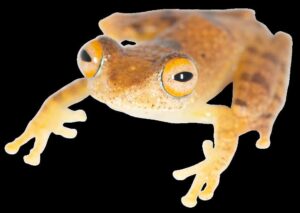Scientists working in the remote rainforests of Madagascar say they’ve discovered seven new frog species whose calls sound similar to Star Trek sound effects, which are often heard on the iconic TV franchise’s various series. Due to these auditory similarities, the researchers have named the newly discovered amphibians after seven of the franchise’s most iconic captains.
“Not only do these frogs sound like sound effects from Star Trek, but it seems also fitting that to find them, you often have to do quite a bit of trekking!” quipped senior study author, Assistant Professor Mark D. Scherz from the Natural History Museum of Denmark at the University of Copenhagen.
“That’s why we named the frogs after Kirk, Picard, Sisko, Janeway, Archer, Burnham, and Pike—seven of the most iconic captains from the sci-fi series,” added team leader Professor Miguel Vences of the Technische Universität Braunschweig, Germany.
The researchers say the discovery merely “scratches the surface” of undiscovered species likely living within the remote region. For example, the same team has discovered over 100 new animal species in the last ten years alone. They also hope their work will inspire improved conservation efforts due to the delicate environment these and Madagascar’s other animals inhabit.
Croaking Like Star Trek Sound Effects May Provide a Survival Advantage
When asked what sound a frog makes, most people would offer a deep, throaty croak. However, these particular frogs, which are part of the genus Boophis, which includes numerous species found across the rainforests of Madagascar, appear to communicate their suitability to females in high-pitched whines that the researchers thought sounded like Star Trek sound effects. This includes on frog call that sounds like a trilling Tricorder and another that sounds like a Boatswain’s Whistle, samples of which can be heard below:
Boatswains Whistle Named after Janeway:
TRICORDER Named for Picard:
For comparison, below are the original Star Trek sound “Boatswain Whistle” and “Tricorder” sound effects:
Although the exact reason for the change in pitch to what scientists term “advertisement calls” has yet to be determined, the German researcher who played a crucial role in analyzing the calls of these newly discovered frogs believes it may be due to the loud confines of the rainforest these animals call home. For example, these Star Trek sound effects frogs live next to a fast-moving stream within the noisy mountainous region of the island’s dense rainforest.
“If the frogs just croaked like our familiar European frogs, they might not be audible over the sound of rushing water from the rivers they live near,” explained Dr. Jörn Köhler, Senior Curator of Vertebrate Zoology at the Hessisches Landesmuseum Darmstadt, Germany, “Their high-pitched trills and whistles stand out against all that noise.”
The team says that even finding these animals in the first place was fortuitous. They were all discovered in remote regions that represented unique micro-climates, although they were found to inhabit the same general area.
“A few species are found in places accessible to tourists, but to find several of these species, we had to undertake major expeditions to remote forest fragments and mountain peaks,” said Vences.
Notably, some of the Star Trek sound effects frogs were likely spotted before but weren’t recognized as belonging to a separate species. However, thanks to their unusual mating calls, the team successfully separated them from others of the genus.


“The appearance of the frogs has led to them being confused with similar species until now, but each species makes a distinctive series of these high-pitched whistles that has allowed us to tell them apart from each other and from other frogs,” Köhler said.
According to the study authors, DNA analysis of the newly discovered frogs also confirmed that they were from a previously unknown species.
Discovery Evokes the ‘Spirit of Star Trek’
An island roughly the size of France, Madagascar is home to around 9% of the world’s frog species. Still, much of the island’s rainforest remains unexplored, leaving the possibility that many rare, unique animals remain hidden while awaiting discovery.
“We’ve only scratched the surface of what Madagascar’s rainforests have to offer,” explained Professor Andolalao Rakotoarison of the Université d’Itasy in Madagascar. “Every time we go into the forest, we find new species, and just in terms of frogs, there are still several hundred species we haven’t yet described.”
The team hopes their discovery will help shed light on the need for increased conservation efforts to protect the fragile habitat of these and other animals that call the island home. This is especially significant for these Star Trek sound effects frogs, who live in a delicate balance with their local micro-environments.
While these future expeditions will likely find even more unique animals, the team says that discovering these frogs has helped stoke their enthusiasm for what those searches may reveal. According to the press release announcing the study, they plan to conduct future expeditions “to seek out new species in forests where no scientist has gone before.”
“There’s a real sense of scientific discovery and exploration here, which we think is in the spirit of Star Trek,” said Scherz.
The study “Communicator whistles: A Trek through the taxonomy of the Boophis marojezensis complex reveals seven new, morphologically cryptic treefrogs from Madagascar (Amphibia: Anura: Mantellidae)” was published in Vertebrate Zoology.
Christopher Plain is a Science Fiction and Fantasy novelist and Head Science Writer at The Debrief. Follow and connect with him on X, learn about his books at plainfiction.com, or email him directly at christopher@thedebrief.org.

